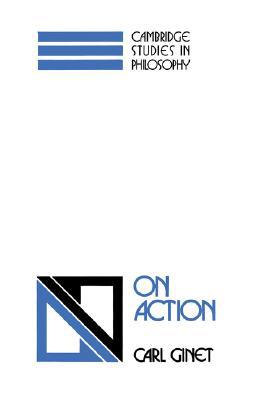

 |

|

The average rating for On action based on 2 reviews is 2 stars.
Review # 1 was written on 2015-10-22 00:00:00 Adam Weatherby Adam WeatherbyDense work of analytic philosophy from 25 years ago, by an author who'd been working on topics in philosophy of action for 30 years up till then. I have no idea if he has revised his views subsequently. In this volume he concisely sets out his analyses of the logical relations making up actions and action-trees, and how they connect to his model of a core of basic mental volitions, distinguished by an "actish" phenomenal quality (I don't find that last posit very convincing, but I think it's dispensable from his overall theory). The work on individuation and aggregation looks fine, though I didn't scratch very hard at the formidable masses of clauses he assembled. On his discussion of intentional action, I would take issue with his assumption that an agent must intentionally perform any act for which they can be held responsible (he attributes this view also to Michael Bratman). This seems to miss the detail of our concepts of negligence and culpability. An agent is held responsible for consequences that *could be rationally expected* from their intentional actions, regardless of whether those consequences were intended. This seems to be the point of the Sidgwick quote that Bratman cites. Consider the different ways in which an agent might put poison in a water supply: (1) they know the stuff is poison, but don't care => blameworthy, even if they were indifferent to the conspiracy; (2) they think it is a beneficial additive, not knowing it has been tampered with => innocent, blame lies with the tamperer; (3) they think it's poison, but actually they're wrong (something like Wells' anarchist in "The Stolen Bacillus") => blameworthy even though they couldn't have succeeded. Ginet seems to have it backwards: if you can be held responsible, then it must be an intentional action, even though you didn't intend it. The final 2 chapters develop an argument for incompatibilism close to the one that Van Inwagen has developed, and then also defends it against general compatibilist counterarguments. As a compatibilist, I feel what's really going on is that "determinism" as it's being played is really vacuous, much like Mill's idea of "psychological law", as Ginet criticises it. But I need to do more thinking about that. The other day I saw Alfred Mele giving an infuriatingly obscure lecture that was far too focussed on the details of someone else's various papers; this is one of those areas where you need to have read the detail of what everyone's been saying about everyone else for about 30 years in order to work out what they're saying now. Much like every other sub-zone of analytic phil, gotta love it. |
Review # 2 was written on 2020-12-23 00:00:00 Nate Devries Nate DevriesThis book is difficult, lacks focus, and uses a lot of very intricate reasoning and dense writing. It presents a non-causal account of action, which means that action is action insofar as it has a phenomenal quality, and not in virtue of some causal relationship to the agent's psychology. |
CAN'T FIND WHAT YOU'RE LOOKING FOR? CLICK HERE!!!